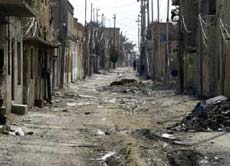|
Provocations Reignite Resistance in Fallujah
 |
|
US crackdown operations draw stronger reactions from resistance fighters in Fallujah. (Reuters)
|
By
Samir Haddad, Mazen Ghazi, IOL Correspondents
BAGHDAD,
August 18, 2005 (IslamOnline.net) – Continued provocations by the US
occupation forces and the Iraqi National Guards as well as dilapidated
infrastructure and services are reigniting resistance attacks in the
western Baghdad city of Fallujah, residents have said.
"The
incessant provocative practices of US-backed Iraqi guardsmen,
including nighttime house raids, insults and theft are infuriating the
population," Ahmed Shaker, a Fallujah resident, told
IslamOnline.net Thursday, August 18.
"Such
practices fuel hatred towards the occupation troops and the Iraqi
forces and consequently increase resistance attacks."
Resistance
attacks against the US occupation forces in the western Iraqi city
have simmered over the past two months after a few-month lull.
On
August 15, the headquarters of the US forces in the city was attacked
with mortar shells, causing a partial destruction to the building, but
on casualties.
On
June 23, Iraqis resistance fighters ambushed a US patrol in the city,
killing six US soldiers and wounding 13 others.
Following
the attacks, the US forces threatened the city residents with new
military onslaughts.
Resistance
hub Fallujah was the scene of one of the bloodiest US raids in
November 2004 with at least 700 people killed, including children and
women, and thousands injured.
Amnesty
International has harshly
criticized the US for killing dozens of civilians in a
number of deadly consecutive air strikes into the war-battered city.
Press
reports and medical sources said that women and children were
among people killed in the predawn missile attacks on Fallujah.
No
Services
 |
|
Residents of war-battered Fallujah are suffering severe shortage of basic services.
|
Ahmed
Khalil, a 45-year-old Baghdad resident, lashed out at the watertight
security slapped against Fallujah.
"I
have to wait for more than five hours at a US checkpoint just to get a
chance to visit my relatives inside Fallujah," he told IOL.
The
occupation forces are imposing a dust-to-dawn curfew in the city
leaving the residents almost imprisoned inside their own houses.
The
city is also suffering severe power and water shortage.
"The
curfew, lasting from 7 p.m. to 6 a.m. and the dilapidated services are
feeding attacks against the US troops and the Iraqi security
forces," Khalil said.
Strategy
Iraqis
analysts gave a different reading of the situation.
"The
increase in attacks is part of a strategy under which resistance
groups operate, " Nabil Mohamed Salim, a Baghdad University
political science professor, told IOL.
He
said resistance groups take into consideration not just the practices
of the occupation forces but also political considerations.
"Therefore,
the rate of attacks goes up and down according to these
developments."
Salim
further maintained that resistance operations have never stopped,
blaming a media blackout.
"There
is a media blackout on covering the resistance attacks, which have
been going unabated against the occupation forces."
Wrong
Expectations
Ali
Al-Hashemi, a political analyst, agreed.
"Many
people had expected that the resistance attacks would come to an end
after the Iraqi elections and massive US onslaughts against Fallujah,
Samaraa, Mosul and Ramadi," he said.
"These
expectations were totally wrong. Resistance attacks became stronger
after the January elections, with the number of daily attacks
estimated at 70."
The
expert stressed that the US offensives against resistance groups in
Fallujah and other Iraqi cities fuel more attacks.
"The
answer lies in the actions taken by the US administration, not the
military which failed in dealing with the Iraqi resistance."
Despite
an US iron-fisted policy in Iraq, attacks and bombings continue
unabated with the US death toll increasing day in and day out.
Since
the start of August alone, around 50 US soldiers have been killed
across Iraq in one of the deadliest periods for the occupation forces.
According
to Pentagon figures as of August 12, a total of 1,850 had been killed
since the March 2003 invasion.
|